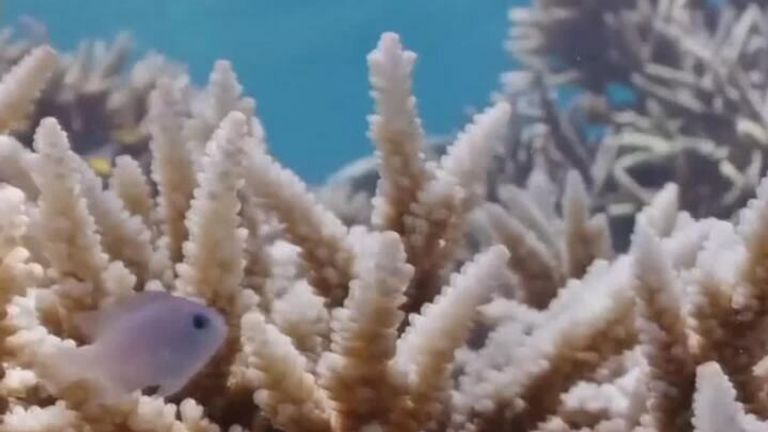Climate change: 'Critical' weeks ahead for Great Barrier Reef as concerns grow over 'severe' coral bleaching
The report comes three days before a United Nations delegation is due to assess whether the reef's World Heritage listing should be downgraded due to the ravages of climate change.
Friday 18 March 2022 18:43, UK
Australia's famous Great Barrier Reef is suffering widespread and severe coral bleaching due to high ocean temperatures two years after a mass bleaching event, a government agency has warned.
The Great Barrier Reef Marine Authority, which manages the world's largest coral reef ecosystem, said that weather patterns over the next few weeks will be "critical in determining the overall extent and severity of coral bleaching across the Marine Park".
"Bleaching has been detected across the Marine Park - it is widespread but variable, across multiple regions, ranging in impact from minor to severe," the authority added.
A warming planet means a warming ocean, and a change in water temperature as little as two degrees Fahrenheit can cause coral to drive out algae.
Coral bleaching is significant because once corals die, reefs rarely come back, and with few corals surviving, the entire reef ecosystems which people and wildlife depend on deteriorate.
The reef has suffered significantly from coral bleaching caused by unusually warm ocean temperatures in 2016, 2017 and 2020.
Greenpeace has told Sky News that the severe and widespread coral bleaching, the fourth in six years, is evidence of the Australian government's failure to protect the coral from the impacts of climate change.
"If the Australian Government was serious about protecting the Reef it would act on its number one threat, climate change, by rapidly replacing coal and gas with clean energy like wind and solar, backed up by batteries."
"Corals can take 10-15 years to recover from bleaching-induced heat stress, and with little time between bleaching events as climate change worsens, it's almost impossible for corals to survive," Greenpeace Australia Pacific climate impacts campaigner Martin Zavan told Sky News.
In July last year, the Australian coral reef was able to garner enough international support to defer an attempt by UNESCO, the United Nations' cultural organisation, to downgrade the reef's World Heritage status to "in danger" because of damage caused by climate change.
The governing body will return to the World Heritage Committee's agenda at its next annual meeting in June, and a United Nations delegation will inspect the reef's health next week.






